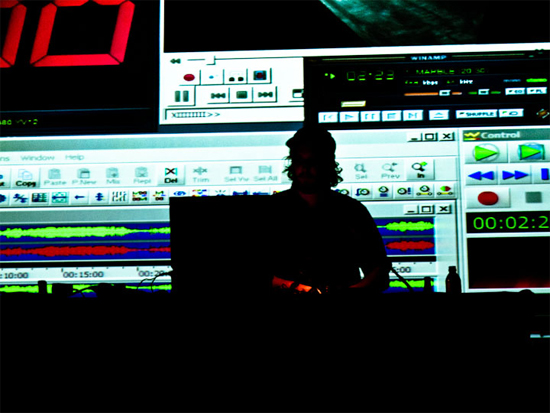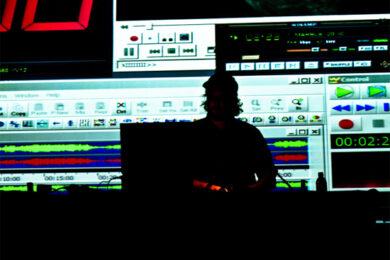We zip beneath cloudy skies, the belly of this powerful RIB – the kind of small inflatable powerboat favoured by coastguards – slamming against gentle waves, a chilly wind slowly penetrating the insufficient layers of clothing we’ve brought for the trip. There are ten of us, mainly Germans, plus two crew, and we’re here to see dolphins and whales: 25 of the existing 78 species of cetaceans are said to inhabit the waters that surround this volcanic island. We scan the sea for signs of their shiny grey skin breaking the surface, but there’s nothing. We head further offshore, heading southwest into hazy sunshine, but even our guide begins to suspect that we’re doomed to failure.
Then, from the corner of my eye, I see something float past the boat, a long, silver streak glinting in the sunshine. The boat slows, circles around, and we crowd its side. For a moment, we wonder if we’re seeing a baby dolphin, but that lasts only a moment and merely shows how little we know. It is in fact a dead espada branco, a silver scabbard fish that’s missing its tail, and one of the crew scoops it out of the water, inviting us to press its flesh, which, tentatively, we do. Its fierce teeth and bulbous eyes ensure it looks terrifying, but it’s as clammy and soft as a baby, and its black cousin looks even less terrifying when cooked up and served with baked banana, as it will be in restaurants around the island tonight and, indeed, every night. Sometimes when you remove things from their familiar context, they pose no threat at all. So the boatman tosses it carelessly into the water, revs the engine once more, and we continue our futile hunt.
Fortunately, this isn’t why we came here. We’ve in fact travelled to the beautiful island of Madeira, a thousand kilometres from the Portugese coast, for MadeiraDig, held in the stunning surroundings of the Casa Das Mudas Contemporary Arts Centre in Calheta and the grounds of the event’s sponsor, the four star Estalgem Da Ponta Do Sol hotel, which sits on cliffs overlooking the tiny seaside village of Ponta Do Sol. Since 2004, this annual micro-festival has hosted some of the finest names in experimental music – though curator Michael Rosen prefers to think of his bookings as “open-minded” – including Ben Frost, Janek Schaeffer, Fennesz, Murcof and Christ., but some might argue it’s an extravagant manner in which to experience their work. It is, however, an exceptional, arguably unbeatable, environment in which to do so, and – when you consider the expenses associated with attending any festival these days – it’s not really quite as exorbitant as it might first seem. The Estalgem (and the seaside hotels nearby who cater for overspill) costs far less than you might expect, and a ticket for all four nights – including transportation to the venue and back, concerts and aftershow parties – costs only €50. Furthermore, some airlines offer reductions for ticketholders, and prices here are cheap: even a hefty glass of Madeira wine at the hotel bar comes in at less than a pint of lager in London.
Calling it a festival is a little misleading. There are just 180 tickets sold, and only two performances take place each evening at the Casa Das Mudas, (though those aftershow parties back at the hotel feature further DJs, as well as a live performance or two). But those who regularly attend shows by the kinds of names here are more than used to intimate performances, and what MadeiraDig seems to have realised is that the specialist appeal of such music can be exploited as a strength, allowing a small, exclusive gathering of fans and artists to mingle together in an extraordinary location that allows them to establish a potent sense of community. This, I realise swiftly, is very important: I’ve stumped up a bunch of cash to get here, and in truth I’m most drawn to the lavish comfort that the festival website showcases. I’ve not had a holiday in the sun for the best part of a decade, and four evenings of dissonance and distortion are a small price to pay for the opportunity to lounge in the off-season sun against a backdrop of ocean and banana groves. But, in finding myself amongst a crowd of people whose attendance was inspired by a line-up including Lee Ranaldo, KTL – Stephen O’Malley of Sunn O)))’s collaboration with Peter Rehberg of experimental label Editions Mego – and Oneohtrix Point Never, I am increasingly drawn into a world that I associate more with grubby, dingy clubs and elitist but sterile arts centres populated by lonely chin-strokers and the Quietus editorial team. Here, with complimentary bath-robes the norm rather than hair-shirts, improvisation and digital interference are transformed into aspects of a long weekend’s luxury, sitting surprisingly comfortably alongside saunas, sea views and the kind of amenities one reads about in broadsheet travel sections but rarely gets to enjoy. It’s like taking the challenge out of ‘challenging’.
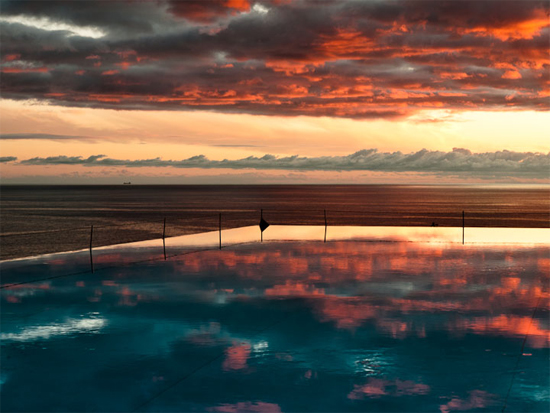
The Casa Das Mudas, our nightly destination, underlines that further, with its award-winning basalt architecture, intended to reflect the island’s volcanic rock, and its balconies looking down to moonlit water over hillsides that glow golden with artificial lights from streetlamps and villas. So we spend afternoons by the infinity pool, sip cold Super Bock beers by evening on a grassy terrace, then dine on fresh fish, sometimes in the restaurant down by the beach, where a moist cliff face constitutes one of the walls, though the experience is on occasion more idyllic than delicious. Afterwards we take a specially arranged bus so we can settle into the plush, if oddly angled, seats in the immaculate surroundings of the auditorium.
Things begin on Friday night with Taylor Dupree, founder of the 12K label, and Jerome Faria, a Portugese sound and visual artist also known as NNY, who face off across a table strewn with gadgets, cables and Macbooks. It’s a peaceful start to the weekend, an almost romantic sound that recalls Eno’s Discreet Music, with the additional creak of wind-up toys and waves of static that seem broadcast from the beach. Their short but surprisingly pretty set swells and dissolves like the backdrop of slowly morphing, muted colours behind them, and it’s in stark contrast to Tim Hecker, who performs afterwards in almost total, disorientating darkness, his head lit by a computer screen as though it’s floating in the gloom. It’s perhaps not surprising that a man whose recent album, Ravedeath, 1972, features titles like ‘Hatred Of Music’, ‘The Piano Drop’, ‘Studio Suicide, 1980’ and ‘In The Fog’ should make a noise like his. The spectral sounds, most recognisably the deepest tones of a church organ, are masked in a blizzard of digital distortion and volume that, on occasions, recalls the shoegazers of the early 1990s. Hecker, however, seeks to destroy such a construction, the powerful clamour emerging more like the collapse of a thousand skyscrapers, a deliberate destruction of manmade constructions that sends aural dust and debris flying into the air around us in an apocalyptic fashion. Eschewing any form of visual accompaniment is perhaps his wisest decision: this way, the inevitable black and white footage of nuclear wastelands and urban deprivation one might anticipate remains entirely in our own imaginations, powered by the crunch and crash of Hecker’s soundtrack. Ravedeath indeed.
The party that night is restrained, and so a group of us gather at a reasonable hour the next morning for an excursion into the mountains at the island’s heart. We leave behind the sunshine as we climb into the clouds past eucalyptus forests, vineyards and banana plantations, the streets lined with exotic flowers, the valleys littered with the remains of homes that have slipped from precarious ledges during heavy rain. We disembark into a heavy, damp mist that obscures the views we’ve been promised and follow a guide down a stony path into a rainforest. As these things go, it’s a little disappointing: the trees are partially denuded at this time of year, though not enough to allow us to see the view beyond their branches, and wildlife is almost entirely absent, with only the occasional rustle of the remaining foliage giving away the existence of resident creatures. The paths are also littered with rotting leaves and fallen boughs, and at times the descent is a little steeper than many had hoped: some slip painfully on the rocks, their shoes entirely inappropriate for the task, while others improvise walking sticks to help them balance.
It strikes me as a metaphor of sorts for the musical journey I’ve now undertaken, the concentration required to navigate a lonely, meandering path rewarded on this occasion by a rainbow at the bottom of the hillside which, quite literally, ends at the restaurant where we’re due to eat. And, sure enough, we find our pot of gold within, albeit in the shape of espatada – meat roasted over fires on stakes that are then hung from the ceiling over our tables – served with fried polenta and salad, followed by a local variation on panacotta, all accompanied by a full-bodied red wine, a powerful espresso and, as a parting shot, a small glass of poncha, the local cocktail made from white rum, lemon juice and honey. Some things, as arduous as they may initially seem, are worth the effort involved.
The same could be said of Oneohtrix Point Never, the ‘headline’ act that night at Casa Das Mudas. He performs beneath a projection of what appears to be the screen of his computer, a muddle of different windows featuring random pieces of video footage, corporate logos and even the soundfile that he’s manipulating, an unusual but brave decision that acknowledges the artifice involved in the performance of digital music by allowing us to see where the music is heading, its changing volume reflected in the soundwave. In a sense, this reflects his style, which is to deconstruct more mainstream electronic themes by seemingly letting the machines take over. There are brief glimpses of recognisable melody and structure, but they drift in and out of focus, snaking around one another and altering shape according to the other sounds with which they interact. Another festivalgoer comments afterwards that there are two types of music fan: those obsessed with tunes, and those in love with sound. I’ve always been more of the former, but Oneohtrix Point Never provides a remarkable, clearly defined bridge from one into the other. I’ve previously struggled to understand the fuss over Replica, his offering earlier this year, but it starts to make sense. I’ve followed the winding, laborious path he’s laid out for me, holding on to what I recognise for as long as possible, then disappeared into unfamiliar yet strangely exciting territory.
Back at the hotel, we troop past the pool to a small temporary bar set up on a rocky outpost shaped like the prow of our RIB. There’s a stage beneath a balcony, with fashionably lit tarpaulins stretching out towards a second one in front. Were it not for what comes next, it could be Ibiza. I’m especially nervous of what I’m about to experience: Schneider TM was signed to City Slang Records, a label whose UK office I ran for eight years, but his drift leftfield from playful, if singular, electronic pop into noise – characterised by his collaborations with Pan Sonic’s Ilpo Väisänen under the name Angel – has never been to my taste. On stage with him is Clara Hill, a key figure in the Sonar Kollectiv who’ll be improvising vocally alongside him, and he’s also joined tonight by Tomoko Nakasato, a dancer and choreographer from Japan. She crouches down on the second stage as Schneider teases sound from a lap steel guitar, then throws herself around with increasing abandon while he treats sounds until they develop into a pulsing, shape-shifting drone. Hill’s disembodied but angelic vocals offer lighter shades amidst this growing, grumbling growl, and, as it proceeds, I lose myself entirely in the performance. From time to time I come to, a grin fixed instinctively upon my face, and when he finally stops – suddenly, aggressively, utterly without warning – I leap to my feet and yell my approval, while around me others do the same. It’s a triumphant moment, especially given that he was a late addition to the bill and concedes later on that what emerged was almost entirely different to what he, Tomoko and Clara had discussed, but then I challenge anyone to sit beneath a starry sky atop a cliff, with the moon poking through the clouds to form a channel of light that trails across the ocean, almost to their very feet, without being profoundly moved by a soundtrack of this magnitude.
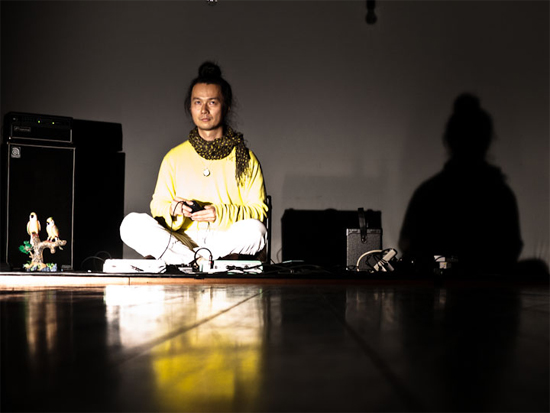
It is, I realise, my failure to seek any sense of meaning in what he’s done and instead to let it simply wash over me that has allowed me to transcend the moment. This in turn also changes my entire attitude to everything that lies ahead. All these years, when faced by improvised, avant-garde music, I’ve been impatiently looking for something that isn’t always there – meaning – just as I searched vainly for whales in this Madeiran December. I’ve tried to impose some form of structure on what I’ve heard when it’s the sheer anarchy of what happens that makes it so thrilling. I’ve sought intellectual justification because I imagined that’s hidden in the music’s motivation, but from now on I choose simply to revel in the sounds. There’s comfort beyond my comfort zone.
So when Aki Onda takes to the stage the following evening, rather than cringing at the sight of a man seated in the lotus position behind a row of cassettes and a kitsch plastic ornament of birds that sing at the press of a button, I settle back and enjoy the spectacle. He manipulates his tapes, ostentatiously whipping his hand around as they screech and squeal, then gets to his feet and wanders around a stage with three amplifiers spread beneath a light bulb that, from time to time, he strikes so violently that it swings high into the rafters, then back down again, threatening to strike his head. Next he picks up a small portable Cube amplifier, plugs in another cassette Walkman, before striding through the auditorium, clambering his way back over the backs of seats, the varied sounds now coming from four different directions.
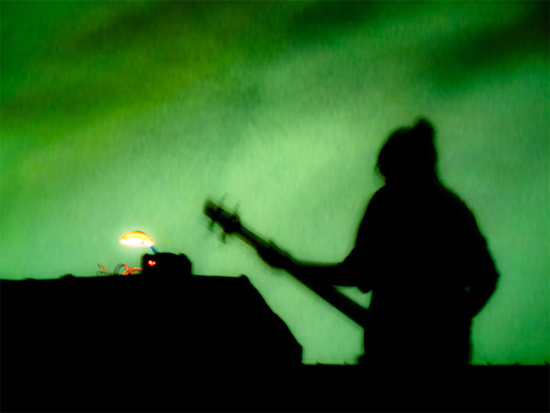
And so to Monday night, one last blast before the journey home. It’s the night I – or at least my eardrums – have feared most: this perfectly curated weekend will culminate in a performance by KTL. At least they’ll be preceded by Nadja, a Toronto/Berlin based duo formed by Aidan Baker & Leah Buckareff whose roots, I am told, lie in the shoegazing scene. I’m ready for an aural massage, and that’s what I get at first, with Baker sending shimmering chords out across the room while Buckareff rocks slowly, quietly, her back towards us, her bass guitar cradled gently in her arms. Then she strikes a button on the table between them, a drum track that seems to have been recorded in a giant cave by a doped-up doom-metal sticksman pierces the serenity, and Baker steps forward to the lip of the stage to strike an ominous powerchord that roars like factory machinery. For half an hour they pile high layer upon layer of noise, tipping our heads back from our feet until they gaze at the stars, yet never allowing us to settle into a cosy, hypnotised state. It would be awesome, but that word is reserved for KTL, who turn things up even louder.
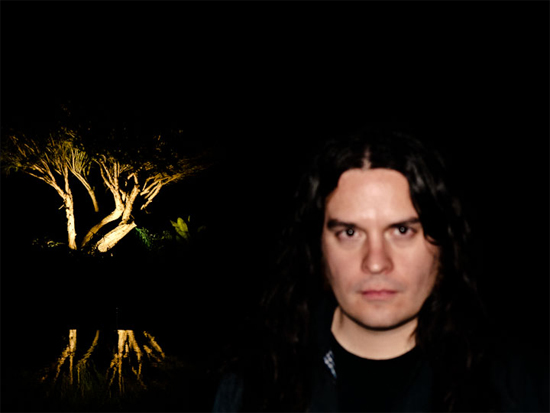
O’Malley and Rehberg stand in almost total darkness, one solitary light behind each of them, fog drifting across the stage, and proceed to build a towering maelstrom of noise that pins me quite literally to my seat. For a moment I feel the onset of a panic attack, my heart pounding, my breath short, and I fight the volume, pinning earplugs with my fingers in as far as they will go. Then I surrender, plucking them out again, and allow myself to float in this liquescent slick. Improvised around their work for a 2007 theatre production called Kindertotenlieder – though I only know this because O’Malley informs me later on, and frankly I wonder how even he can tell – it’s everything I expected from the man from Sunn O))): a monstrous cacophony, a ghoulish howl of guitar chords that crumble without ever decaying, accompanied by electronic squalls that claw and splinter the skies. And yet, inevitably, it’s nothing like I imagined. There are no melodies for me to cling to, no rhythms to hold me up, but oh, what a sound! What force, what power, what sheer, inexplicable might! What an utterly immense, Brobdingnagian punch to every molecule in my body! Throw me down, beat me black and blue ’til I lie in a pool of decaying tissue, mangled gristle and sticky, coagulated blood! Intellectualise this, motherfucker!
Of course that’s not how it ends. I pick up my butchered carcass and stagger to the bus, my ears alert to the harmony of its brakes and air conditioning, and then we return to the luxury of our hotel, where the staff give up charging for drinks and instead start dancing like there’s no shift tomorrow, where guests throw themselves, fully clothed, into the pool, where the moon hangs heavy but its reflection is shattered in the Jacuzzi, where waves batter the beach but soothe the mind, where what once seemed so elitist now seems so inclusive, where what once seemed so demanding now seems so enticing. There’ll be no more futile searches for the art of noise. This journey has revealed a simple splendour in sound. The very hills of Madeira are alive with the sound of music, even though its seas only offered me dead fish…

